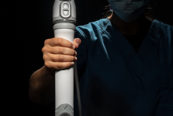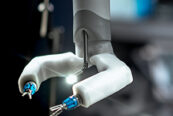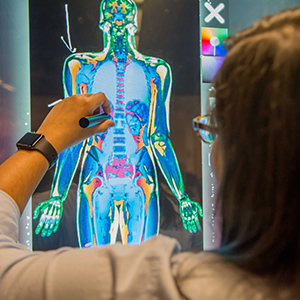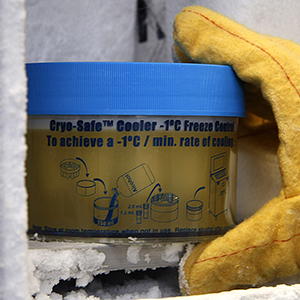by Vicky Cerino, UNMC
HOUSTON (May 5, 2014)—For more than 10 years, inventors at the University of Nebraska Medical Center and the University of Nebraska-Lincoln have spent countless hours building, testing, perfecting and patenting miniature surgical robots.
The robots were developed for National Aeronautics and Space Administration (NASA) with the hope that flight surgeons can one day perform emergency surgery in space.
The next step called for testing the mini-robots in a simulated space environment.
This was accomplished in late April when Anton Simorov, M.D., UNMC surgery fellow, and UNL engineering students, Kearney Lackas, Walter Bircher and Tom Frederick, donned flight suits and took off from Johnson Space Center in Houston.
During two parabolic flights, the UNMC-UNL experienced 80 parabolic maneuvers that create a weightless environment in a modified 727 jet. The jet, at 24,000 feet, climbed 45 degrees to 34,000 feet. The pilots then perform a “push over” maneuver to create zero gravity or weightlessness for 20-30 seconds.
Dr. Simorov practiced surgical techniques — grasping, pulling, and cutting — during the weightless time periods, while engineering students monitored equipment.
“We accomplished our experiment goals. We collected a lot of data which will take several weeks to process and analyze,” Dr. Simorov said. “This will allow us to further our experiments. It was a great, unforgettable experience.”
The flight was the result of a 2013 visit by NASA officials to learn about university research with potential applications in space, said Marsha Morien, executive director of the UNMC Center for Advanced Surgical Technology. “The NASA visitors saw the project and said it was ready for flight testing,” Morien said. “Getting this flight is amazing. It’s highly competitive.”
Dmitry Oleynikov, M.D., a co-inventor of the mini-robots, said the flight was a big step.
“We’re very excited. We’ve always felt it was a good idea to take a surgical platform, miniaturize it and use it in places you can’t have a hospital,” said Dr. Oleynikov, director of the Center for Minimally Invasive Surgery and the Center for Advanced Surgical Technology at UNMC. “It’s a natural extension of that concept to use it in space, on the battlefield and in other remote areas.”
Shane Farritor, PhD, UNL professor of mechanical and materials engineering, said the flight represents a key milestone in the surgical robot program. “It was a great learning experience for the students to successfully deploy a complex field system and operate it in a unique environment,” said Dr. Farritor, co-inventor of the mini-robots. “It really moved the research forward. We have more to do, but I really like where we are.”
Through world-class research and patient care, UNMC generates breakthroughs that make life better for people throughout Nebraska and beyond. Its education programs train more health professionals than any other institution in the state. Learn more at unmc.edu and follow us on social media.










